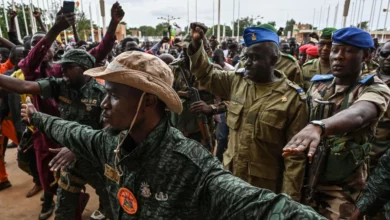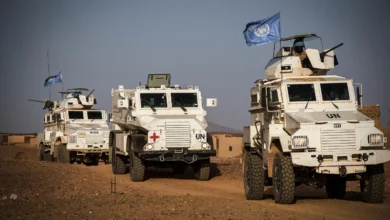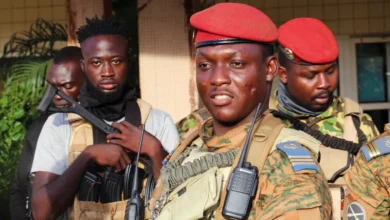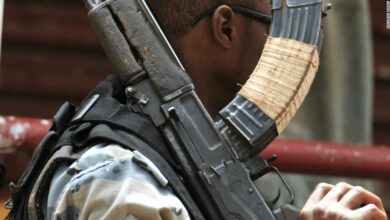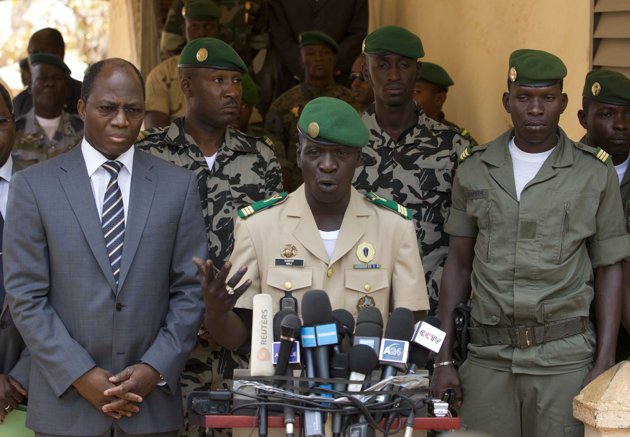
BAMAKO, Mali — Just 12 days after they stormed the presidential palace, the young officers that seized control of Mali in a coup were slapped Monday with harsh financial sanctions that could cause the country to run out of gasoline.
The body representing nations in West Africa announced Monday that starting immediately they are closing the land borders with Mali. The landlocked nation of over 15 million imports nearly all its petroleum products from neighboring Ivory Coast, and economists say gas stations could run dry within weeks. The country's account at the regional central bank has also been frozen, meaning that the junta will struggle to pay the salaries of government employees, including the very soldiers whose loyalty they need to retain power.
"All of the measures are applicable starting today and until the constitutional order is restored," said Alassane Ouattara, the president of Ivory Coast who is the chair of the Economic Community of West African States, after an emergency summit in Senegal. "The measures taken by the junta are in the right direction, but are not sufficient," he said.
The regional body representing 15 nations in West Africa had issued a 72-hour ultimatum to the soldiers that grabbed power, which expired Monday. In an effort to stave off the sanctions, the captain who led the coup held a press conference Sunday to say he was reinstating the constitution and planning to hold elections.
Capt. Amadou Haya Sanogo refused to give a timeline on when the elections would be held, however, and dodged questions on whether he would continue to be president during the period leading to the election.
Meanwhile, the government on Monday also lost control of the northern half of the nation, as rebel flags were hoisted over the last three major towns still under government control. In just three days, the Tuareg rebels swept across the north, taking the regional capital of Kidal on Friday, the largest city of Gao on Saturday and the fabled desert outpost of Timbuktu on Sunday.
Commentators on television are already talking about the possible partition of Mali, which has weathered numerous rebellions by the lighter-skinned Tuaregs who have long felt marginalized by the darker-skinned Bambaras, who dominate the south where the seat of government is located.
At no time in the past did either of the three towns fall, indicating how much ground the rebels have been able to cover in the wake of a 12-day-old coup in the distant capital, which has left both the military and the government in disarray.
"The north is 1,000 percent in the hands of the rebels. There's no resistance, there's nothing. … They have taken all the strategic points. In all the towns," said an official in the mayor's office in Kidal, who requested anonymity because he feared for his safety. "There is no Malian state left."
Even before the coup, the government struggled to control the distant north, both due to the country's enormous geography and because of the age-old discord with the Tuaregs. In recent years, the lack of government in the north has created a sanctuary for drug traffickers and Al-Qaeda terrorists, who have set up bases in the forlorn dunes.
With the government in post-coup disarray, even the garrison towns like Gao and Kidal proved no match for the rebels. Soldiers were seen dumping their uniforms and running. A resident of a town on the road leaving Gao saw a convoy of 14 military trucks speeding away, beating a panicked retreat.
Unlike in previous years, the rebels are no longer a unified movement fighting for an independent Tuareg homeland, called Azawad in the Tamashek language. The National Movement for the Liberation of the Azawad, or NMLA, is fighting for an independent Tuareg homeland, known as the Azawad. In addition, an Islamist group called Ansar Dine is fighting to impose sharia law in northern Mali.
Residents of Timbuktu on Monday awoke to find the ominous black flag of the Islamist faction flying over their ancient city, a worrying development in a city that used to rely on tourism for the bulk of its economy.
Contacted by telephone, Timbuktu Mayor Ousmane Halle said that he had received phone calls from three imams of local mosques, worried because they had been contacted by Ansar Dine. The rebel group is asking to see all the imams of the city, and Halle says they are worried that the group wants to apply sharia, a form of Islamic law that does not jive with the moderate interpretation of the religion practiced by most of Timbuktu's mosques.
"They called us to this meeting," said the imam of the Grand Mosque of Timbuktu, Abderrahmane Ben Essayouti. "We will see what the future brings. We practice a tolerant Islam. For them, it's sharia that we should be practicing."
The mayor of Timbuktu said that it's unclear which of the rebel movements has the upper hand. He said that he has requested a meeting with the spiritual head of Ansar Dine in order to complain about the proliferation of weapons.
"The rebels completely control the city. But there are several movements among them," said Halle. "What worries me is the weapons. The army has deserted the military camps. And the rebels, as well as others have raided their munitions. You now see 13-, 14- and 15-year-old boys with machine guns in the streets. If I told you I wasn't scared, I'd be lying. What I reproach is that these people have occupied a territory. But they should at least secure it. I've asked to see them, but they have not yet responded."
In Kidal and Gao, shopkeepers reported that the Islamist rebels went from business to business telling merchants to take down pictures of unveiled women, including a hairdresser's posters showing photographs of different hairstyles.
In Gao, the largest city in the north which fell on Saturday, residents said that they no longer know who is in charge.
"It's chaos. We don't even know who controls the city, and who is doing what," said student Ahmed Ould Fneiny. "We see Ansar Dine with their flag. We see the MNLA. … There are people in military uniforms who have stolen all the cars. We can't leave the city. One liter of gasoline is now 1,000 francs (US$2) whereas it was 650 francs (US$1.3) yesterday."
The rebellion began in January, after Tuareg fighters who had been on the payroll of ex-Libyan leader Muammar Qadhafi returned to Mali, bristling with arms. For the first two months, the insurgency advanced into the remote north, taking a dozen small towns, though failing to capture any of the major population centers.

